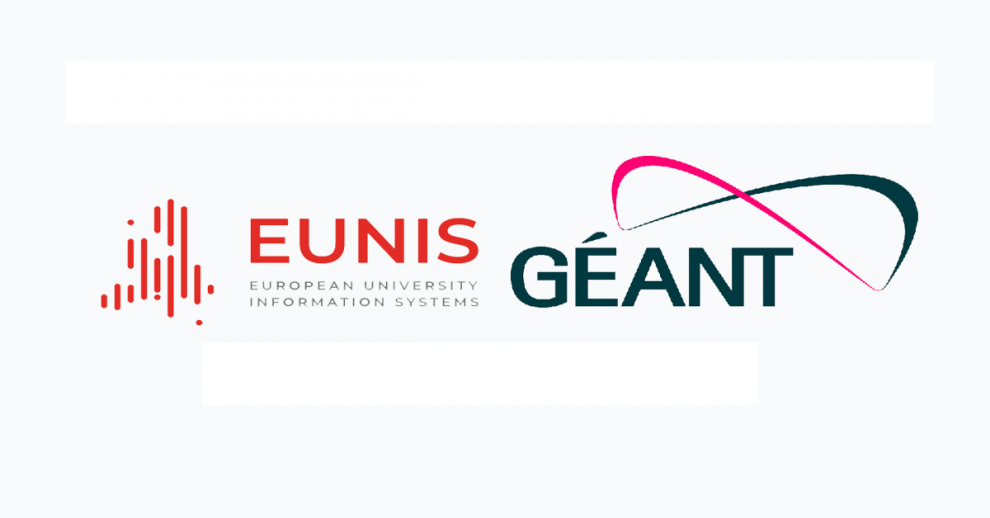On October 14, 2022, 39 interested parties attended the joint GÉANT- EUNIS cloud workshop on the GAIA-X and EOSC projects. Jakob Tendel from the GÉANT cloud team explained how EOSC is envisioned as federated patchwork of interoperable services and data environments, together with policy, administration, and infrastructure levels. G֤ÉANT is engaged at policy level with EOSC association, and in core technologies, like SSO, authentication environment, as well as procurement services. Individual NRENs are also active in EOSC projects, in areas like governance, taskforces, and technology implementation. The EOSC Future 2023 project will provide a data market that can be integrated and is interoperable – for data storage, computation, discovery, recombination and workflows. This objective is to offer a holistic user experience in a seamless single marketplace. There is a call for Cloud Service adoption by non-profit higher education institutions in a position to serve a large number of users and aggregate demand for services. This is a market driven approach, partnering suppliers and non-profits.

Erik Kentie, from SURF, addressed the group on the GAIA-X Project. As a member of GAIA-X since 2020, SURF shares GAIA-X values, such as sovereignty, interoperability, public values, harmonisation of data sharing, and an independent cloud for Europe. It facilitates innovation, data standards in academic and business research. GAIA-X NL hub is led by TNO, member of SURF, and acts in several sectors: health, education, mobility, governance, energy. There is a open call for funding here as well. GAIA-X NL is currently working on an Education and Skills Hub (learning analytics and secure cloud for students), Health Data Space (Heracles for cancer, Health-Holland), structura X to connect cloud layers, resources, cloud providers and data centers. Next steps will focus on finding working groups and specialists in architecture, semantics, definition of services, implementation of FAIR, federation of clouds, access management.
Marius Politze from Fraunhofer-RWTH Aachen University spoke about the FAIR data space funded by the German Ministry of Science and Education – the German National Research Data Infrastructure (NFDI). This was established to build a common cloud based data space for Industry and Science by 2024. The two communities – GAIA-X for industry and NFDI for science working in parallel to build the necessary template for a FAIR common data space. Main challenges are due to different values, and different parts are involved: technical (services and demonstrators), legal and ethical.
Albert Peci (Web3 Lead and Co-Founder of deltaDAO) presented a short demo of cooperation on an Open Science Portal and connecting AI services to GAIA-X. deltaDAO is a GAIA-X member. This lab is working towards having all Data Services like analysis, computing, machine learning, consumption, exchange, with common standards and common infrastructure, across sectors, securely and transparently. The goal is to have 8%-10% GDP in 2025. In order to minimise risks, no copy or sharing of data is done by deltaDAO, but the algorithms are sent to data owners instead. Algorithms are executed on premise. Challenges are difficulty getting high quality data, major players with lock-in effects, trust, new regulations and technical innovations.
Harald Wagener, Co-Lead of WP7 Cloud Services in EOSC-Life and part of the Technical Board Leadership team on GAIA-X Health-X. The goal of HEALTH-X is to develop and implement the vision of the European Health Data Space to have a single European Health Data Space, guaranteeing secured and trusted use of data, taking data-based real world evidence research as the new standard. Today there is a huge gap in Germany and in Europe between the ideal and the actual state of Health Data. Printouts of isolated, unstructured, undigitised, fragmented and incompatible data make it difficult to process and poses many risks. GAIA-X technologies can provide a secure architecture for all kinds of data. Data coming from primary and secondary health sectors and can have secondary use via data donation. New ecosystems are being built based on modular platform services and according to an Operational Business Model. Health-X also has an Innovation Hub where startups and other companies can submit concepts and fundings.
EUNIS is the European University Information Systems organization whose aim is to assist their members develop their IT landscape by sharing experiences and working together.




